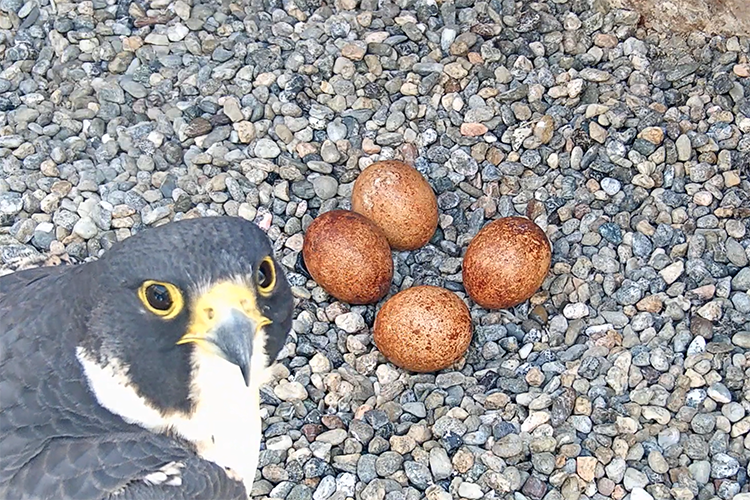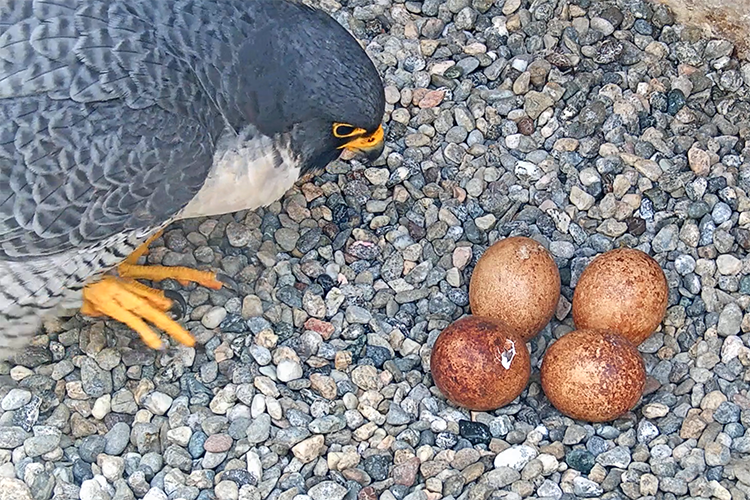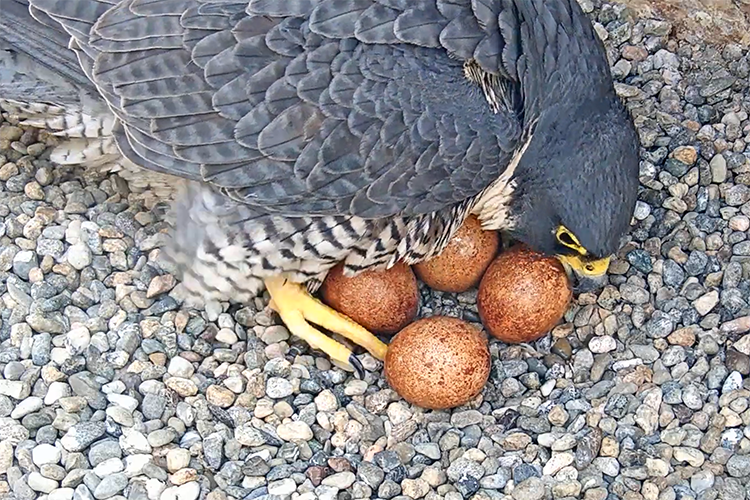This Saturday is Hatch Day for Berkeley’s newest falcon chicks
Join the Cal Falcons Q&A session and watch party at 1 p.m. Pacific Time
April 16, 2021

Falcon mother Annie has been seen and heard on a Campanile webcam cooing to her chicks, which are likely to start coming out of their shells on Saturday. (Cal Falcons image)
There’s a lot of clucking going on high atop UC Berkeley’s Campanile. Pipping has begun to occur, and, if all goes well this Saturday, April 17, hatching. That day, Hatch Day 2021, it’s predicted that the chicks of resident peregrine falcon parents Annie and Grinnell will start emerging from the four eggs that arrived in March during an eight-day stretch.
“Annie’s been quietly clucking to the eggs. This behavior encourages the chicks to work on hatching and vocalize back,” said biologist Lynn Schofield, who, with Sean Peterson, a Berkeley Ph.D. student and her husband, runs the Cal Falcons social media program. “Inside the eggs, it takes 24 to 72 hours for a chick to hatch, from the first pip to the finish. In that time, an air bubble in the egg will expand, and the chick will be breathing air for the first time.”
On Friday afternoon, one egg already was showing signs of pipping, or cracking, according to Peterson.

Grinnell checks out the eggs. The one closest to him was already showing signs of pipping on Friday afternoon, April 16. (Cal Falcons image)
Cal Falcons will host a live Q & A session and a watch party for the public on Saturday at 1 p.m. Pacific time on YouTube and the Cal Falcons website. Schofield and Peterson will discuss the hatching process and show highlights of any hatching that’s already occurred, but devote most of their time to answering viewers’ questions. You can check out the falcon hatching activity any time via the nest webcam on the tower.
This is the second year in a row, because of the coronavirus pandemic, that Hatch Day can’t be enjoyed, as it was in 2019, on the jumbo screen outside the Berkeley Art Museum and Pacific Film Archive. But last year’s live Hatch Day Q&A, held shortly after COVID-19 was declared a pandemic and Berkeley switched to online instruction, was a success that drew about 700 guests, and nearly 9,500 people have viewed that recording since.

Annie refused to let Grinnell sit on the eggs on Thursday, an indication, according to Sean Peterson of Cal Falcons, “that the eggs are close to ready.” (Cal Falcons image)
“We’ve definitely had our following continue to increase since last year — we’re at 4,154 followers on Twitter, 5,273 on Instagram and 3,236 on Facebook,” said Peterson. “We just started the TikTok channel, but that probably won’t take off until we are able to post chick clips. We’ll be super busy on Hatch Day trying to get footage of the chicks. The parents will still sit pretty tight on them most of the time, so we’ll have to be vigilant to make sure we’re getting good footage when they’re briefly off the chicks to get them food.”
Until then, both Annie and Grinnell are communicating through the eggshells with their chicks, said Schofield, adding that “this means we’ve almost certainly had at least one viable egg this year. Last year, it was about this time that we noticed one of the eggs was damaged. This year, all the eggs still look great, so hopefully we’ll have all four hatch.”
And the chicks will be pipping using what’s called an egg tooth — a small projection from the tip of a bird’s beak that helps crack the shell.
“These aren’t permanent teeth and are absorbed in the growing beak pretty quickly,” said Schofield. “Almost all birds have one, with a couple of minor exceptions. Some species, like kiwis, develop really strong leg muscles to push their way out of the eggs.”
Cal Falcons is planning to hold a naming contest for the chicks immediately after the chicks are banded, which will happen in early- to mid-May. Suggestions will be accepted on social media for sets of four names, and the most-liked suggestions will be moved on to the final vote a few days after the banding happens.
The three chicks of 2020 were named Poppy, Sequoia and Redwood after 3,455 members of the public cast votes for their favorite set of three names. This is Annie and Grinnell’s fifth breeding season on the campus.